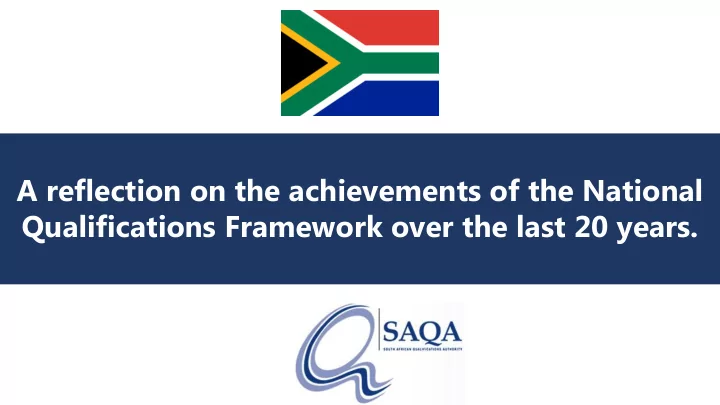

A reflection on the achievements of the National Qualifications Framework over the last 20 years.
Our country inherited a racially segregated, unequal, unfair education and training system from the apartheid years
The SA NQF was intended to create a single integrated national framework for learning achievements, facilitate access for everyone in the country, and enable quality learning, transparency, and mobility along learning-and-career paths
It was also intended to accelerate the redress of past discrimination in education, training and employment opportunities
The intention from the start of democracy was, and remains, that the NQF must enable individual development, as well as contributing to the social and economic development of the country as a whole
The NQF is a contested, ‘living’ object, realised in the ‘ecology’ of its implementation
What has been achieved in its first 20 years
systemic integration
Quality
Transparency
Redress
learner access and progression
What did we do well NLRD Transparency Single National 16.8m Framework Foreign Qualifications Open to all Different quals on one framework
We’ve achieved some success, but more work is needed Known and Redress: Kha Ri understood Gude Contribution to Professional individual and bodies nation
Needs more attention and focus Redress: Learning RPL pathways Redress: worker Quality education
Priorities for the immediate and medium-term future
the shift towards a stronger coordinating role for SAQA
the promotion of genuine qualifications of quality
combating fraud and misrepresentation in the system
implementing the White Paper for Post-School Education and Training
Education is the most powerful weapon which you can use to change the world.
Thank you - questions
1. A reflection on the achievements of the National Qualifications Framework over the last 20 years. 2. Our country inherited a racially segregated, unequal, unfair education and training system from the apartheid years. 3. The South African National Qualifications Framework (NQF) was intended to create a single integrated national framework for learning achievements, facilitate access for everyone in the country, and enable quality learning, transparency, and mobility along learning-and-career paths. 4. It was also intended to accelerate the redress of past discrimination in education, training and employment opportunities. 5. The intention from the start of democracy was, and remains, that the NQF must enable individual development, as well as contributing to the social and economic development of the country as a whole. 6. The NQF is a contested, ‘living’ object, realised in the ‘ecology’ of its implementation. 7. This paper touches on what has been achieved in its first 20 years, touching on 8. systemic integration, 9. initiatives towards, and achievements relating to, systemic quality and transparency, 10. (c) progress regarding redress, and 11. (d) the state of learner access and progression. 12. priorities for the immediate and medium-term future, including 13. the shift towards a stronger coordinating role for the South African Qualifications Authority (SAQA), 14. (ii) the promotion of genuine qualifications of quality, 15. (iii)combating fraud and misrepresentation in the system, and 16. (iv) implementing the White Paper for Post-School Education and Training.
Recommend
More recommend